

Atoning for the Past. The genuine effort towards restorative justice in Morocco Morocco has implemented a pioneering restorative justice program that aims to compensate, both financially and psychologically, the victims of prior human rights abuses.
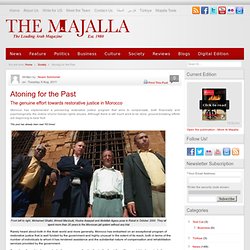
Although there is still much work to be done, ground-breaking efforts are beginning to bear fruit. This post has already been read 163 times! Morocco: A 'Democratic Moment'? During the last years of his reign, King Hassan II initiated a modest and controlled reform process intended to ease the transition of power by attempting to hand the reigns over safely to the crown prince at the time, nowadays King Mohamed VI.
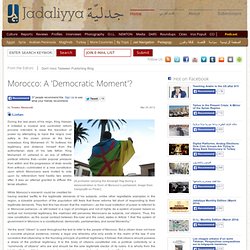
To buttress his legitimacy and distance himself from the authoritarian style of his late father, King Mohamed VI ushered in an era of diffident political reforms that—under popular pressure from within and the progression of Arab revolts from without—culminated in a new constitution upon which Moroccans were invited to vote upon by referendum held hastily two weeks after. It was an attempt granted to diffuse the tense situation. Ezzedine Errousi, a Moroccan Prisoner of Conscience, Released: 134 Days on Hunger Strike. On 1 December 2011, Ezzedine Errousi, a Moroccan student from the city of Taza, was taking part in a student union protest on the Taza University campus.
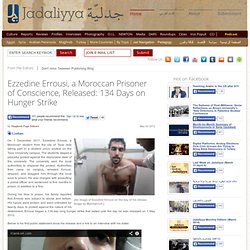
The students staged a peaceful protest against the deplorable state of the university. The university sent the local authorities to disperse the protest. Authorities then came on campus, arrested Errousi, stripped, and dragged him through the local souk to prison. He was charged with assaulting a police officer and sentenced to five months in prison, in addition to a fine. During his time in prison, his family reported that Errousi was subject to abuse and torture. Below is his first public statement since his release and a link to an interview with his sister: Read an interview conducted with his sister after his release on Mamfakinch. Morocco: Drop Charges Against Detained Rapper.
(Casablanca) – Moroccan authorities should drop charges and release a rapper who has spent three weeks in pretrial detention on charges that he insulted the police in his songs and a video set to his music, Human Rights Watch said today.
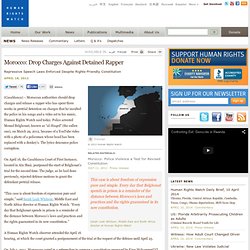
Police arrested Mouad Belghouat, known as “al-Haqed” (the sullen one), on March 29, 2012, because of a YouTube video with a photo of a policeman whose head has been replaced with a donkey’s. The lyrics denounce police corruption. Morocco: Prison for Rapper Who Criticized Police. (Rabat, May 12, 2012) – The sentencing of a rapper on May 11, 2012 to one year in prison for “insulting the police” shows the gap between the strong free-expression language in Morocco’s 2011 constitution and the continuing intolerance for those who criticize state institutions.
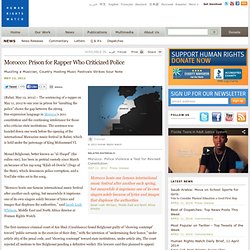
The sentence was handed down one week before the opening of the international Mawazine music festival in Rabat, which is held under the patronage of King Mohammed VI. Mouad Belghouat, better known as “al-Haqed” (the sullen one), has been in pretrial custody since March 29 because of his rap song “Kilab ed-Dowla” (Dogs of the State), which denounces police corruption, and a YouTube video set to the song. “Morocco hosts one famous international music festival after another each spring, but meanwhile it imprisons one of its own singers solely because of lyrics and images that displease the authorities,” said Sarah Leah Whitson, Middle East and North Africa director at Human Rights Watch.
Status of Women in 'Reformist' Morocco. Just three years ago, a teenager from Western Sahara (which has long been occupied by Morocco) left a human rights meeting, at which point she was accosted, as she reveals in a YouTube video, by six plainclothes Moroccan policemen.
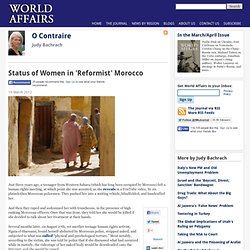
They pushed her into a waiting vehicle, blindfolded, and handcuffed her. And then they raped and sodomized her with truncheons, in the presence of high ranking Moroccan officers. Once that was done, they told her she would be killed if she decided to talk about her treatment at their hands. "Violating Sacred Values" in Morocco: Free Speech with an Exception. A simple caricature by a cartoonist and a four-minute video featuring an activist expressing his dissent are arguably some of today’s most common mediums for political expression. In post-constitutional reform and post–parliamentary-election Morocco, sharing a political cartoon and criticizing the monarchy in a video is a crime, met with jail time. While reforms have been implemented for months, vague language has allowed Mohammed VI’s regime to selectively interpret and enforce its reforms whenever the monarchical institution is seen to be threatened.
Morocco’s previous constitution contained many controversial articles that were either lost or split in the 2011 constitution. Young Women Demanding Justice and Dignity: By All Means Necessary. Amina Filali was a young Moroccan girl who was raped at the age of 15 then forced to marry her rapist.
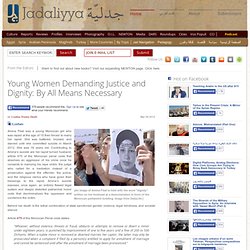
She was battered, bruised, and starved until she committed suicide in March 2012. She was 16 years old. Notes from Western Sahara: An Interview with Fatma El-Mehdi. As the Arab Spring spread across several countries in the Middle East and North Africa, American philosopher Noam Chomsky argued that it did not originate in Tunisia, as is commonly understood.
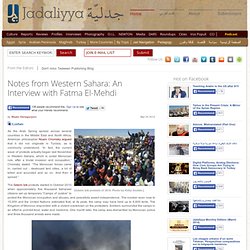
“In fact, the current wave of protests actually began last November in Western Sahara, which is under Moroccan rule, after a brutal invasion and occupation,” Chomsky stated. “The Moroccan forces came in, carried out - destroyed tent cities, a lot of killed and wounded and so on. And then it spread.” The Gdeim Izik protests started in October 2010 when approximately five thousand Saharawi citizens set up temporary “Camps of Justice” to protest the Moroccan occupation and abuses, and peacefully assert independence. The World Factbook. ShowIntroduction :: MOROCCO Panel - Collapsed In 788, about a century after the Arab conquest of North Africa, a series of Moroccan Muslim dynasties began to rule in Morocco.
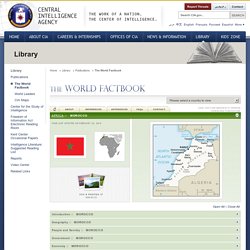
In the 16th century, the Sa'adi monarchy, particularly under Ahmad al-MANSUR (1578-1603), repelled foreign invaders and inaugurated a golden age. The Alaouite Dynasty, to which the current Moroccan royal family belongs, dates from the 17th century. Morocco. Skip to main content World Malaria 2014 Access Search Advanced search Navigation Language عربي 中文 English Français Русский Español Countries Morocco Map This map is an approximation of actual country borders.
Statistics. A Monarchical Affair: From Morocco to the Arabian Peninsula. When protests in North Africa ousted dictators and began spreading elsewhere in the region, decades-old alliances between the Arab monarchies were strengthened with the common interest of staying in power at all costs. While Morocco’s political and economic ties have historically been predominantly directed toward European markets, Morocco has recently oriented its outlook toward the East, finding common ground with the monarchies of the Arabian Peninsula. Morocco’s relationship with the monarchies in the Gulf is nothing new. When King Hassan II of Morocco prioritized the acquisition of the Western Saharan territory as the principal objective of his reign, Saudi Arabia provided an annual allowance of one hundred million dollars throughout the 1980s. The amount was specifically intended for “anti-Polisario activities.”
Hassan II returned the favor in 1990 when he sent over one thousand troops to the Saudi-Iraqi border during the Gulf War. A Year After: The February 20 Protest Movement in Morocco. El Haqed: Examining Morocco's Judicial Reform in 2012. On 9 September 2011, Mouad Belghouat, a 24 year old Moroccan rap musician, was passing out fliers to advertize for a demonstration in his impoverished neighborhood outside the cosmopolitan city of Casablanca.
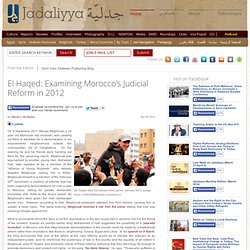
On the evening he and his friends were handing out fliers for the upcoming march, Belghouat was approached by another young man, Mohamed Dali, later reported to be a member of the “Alliance of Young Royalists,” who verbally targeted Belghouat, calling him a traitor. Belghouat himself is a member of the February 20th movement, a coalition of activists that has been organizing demonstrations for over a year in Morocco, calling for greater democratic processes and limits to the king’s power. As Belghouat’s story goes, the men exchanged words only. However, according to Dali, Belghouat physically attacked him from behind, causing him to sustain a head injury.